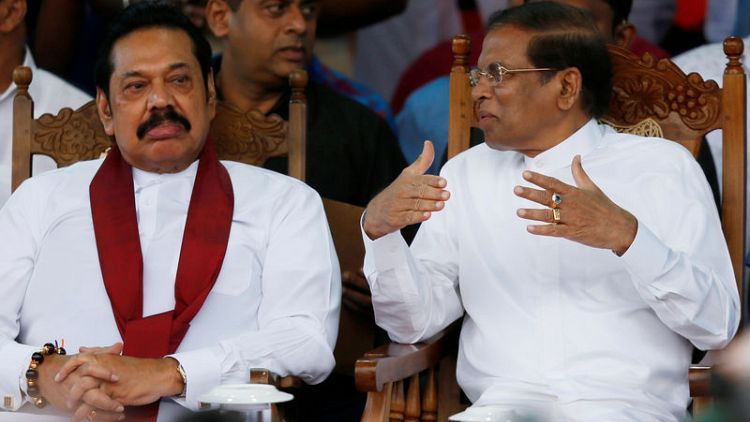By Shihar Aneez
COLOMBO (Reuters) - A political impasse in Sri Lanka could be set to drag on longer after President Maithripala Sirisena said on Sunday he would not reinstate Ranil Wickremesinghe as prime minister even if he was able to prove his majority in parliament.
"I will not appoint Ranil Wickremesinghe as prime minister in my lifetime. Even if they have a majority, I have told them not to propose him as I won't appoint him as prime minister," Sirisena told foreign media.
He said he replaced Wickremesinghe with pro-China former leader Mahinda Rajapaksa because of policy differences and a sharp rise in corruption.
Sirisena said he planned to appoint a commission to investigate corruption and malpractice "under Prime Minister Ranil Wickremesinghe's government."
A former cabinet spokesman under Wickremesinghe said Sirisena should be ashamed to make these allegations because he was the head of the cabinet under the prime minister Wickremesinghe.
"Why didn't he say this over all those last few years and investigate?" Rajitha Seneratne said to Reuters.
Sagala Ratnayaka, former minister in charge of police under Wickremesinghe, said: "If President Sirisena's wild allegations continue, I will be forced to divulge details on who interfered, when, where and how."
Sri Lanka faces a deepening political crisis with the newly appointed Rajapaksa government refusing to resign despite losing two confidence votes. Sirisena has refused to accept the outcome of the votes saying proper parliamentary procedure has not been followed.
Sirisena dissolved parliament and ordered elections to break the deadlock, but the Supreme Court ordered a suspension of that decree earlier this month, as it hears petitions challenging the move as unconstitutional. A verdict is expected on Dec. 7.
He expected all problems to end with the Supreme Court ruling, he said.
It was not clear how the impasse will end if the court finds his move to dissolve parliament unconstitutional. If it is constitutional, Sirisena can call for a general election.
According to the island nation's constitution, the president has the power to appoint a prime minister who he thinks can command the parliament majority. It was not immediately clear how Sirisena could reject Wickremesinghe if he has the majority.
The president said he was ready to appoint anyone from Wickremesinghe's party as prime minister except Wickremesinghe himself and former army chief Sarath Fonseka who was a minister in the ousted cabinet.
"To appoint a prime minister, I should also like the person and should be able to work with the person," he said.
The Wickremesinghe-led centre-right United National Party though, has so far refused to propose anyone but Wickremesinghe as prime minister.
(Reporting by Shihar Aneez; Editing by Euan Rocha, Richard Balmforth)
